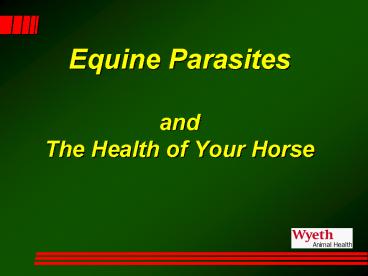Equine Parasites and The Health of Your Horse - PowerPoint PPT Presentation
1 / 41
Title:
Equine Parasites and The Health of Your Horse
Description:
The first equine dewormer with activity against encysted small strongyles ... Post-anthelmintic colic. Adult large strongyle lethality. Gut inflammation & edema ... – PowerPoint PPT presentation
Number of Views:331
Avg rating:3.0/5.0
Title: Equine Parasites and The Health of Your Horse
1
Equine ParasitesandThe Health of Your Horse
2
Keys to Equine Health Care
- Nutrition Dental Care
- Vaccination Disease Prevention
- Pasture Stable Management
- Hoof care
- Parasite Control
3
Parasite Control
- Internal Parasites An Overview
- Traditional Parasite Control
- New Concerns
- A New Approach
- Moxidectin
4
Key Equine Parasites
- Large Strongyles (bloodworms)
- Small Strongyles (cyathostomes)
- Ascarids (large roundworms)
5
(No Transcript)
6
(No Transcript)
7
(No Transcript)
8
(No Transcript)
9
(No Transcript)
10
(No Transcript)
11
Parasites of Secondary Importance
- Bots
- Pinworms
- Tapeworms
12
(No Transcript)
13
(No Transcript)
14
(No Transcript)
15
Other Equine Parasites
- Threadworms
- Stomach worms
- Ligament worms
- Stomach hair worms
- Lungworms
16
Traditional Parasite Control
- Large strongyles most damaging
- Migrating larvae damage cranial mesenteric
artery and other tissues - Often associated with colic
17
(No Transcript)
18
(No Transcript)
19
Traditional Parasite Control
- Traditional control programs
- Focused on large strongyles
- Treatment intervals of 4-8 weeks
- Pasture sanitation
20
New Concerns Small Strongyles
- Small strongyles Cyathostomes
- Encysted larval forms
- new pathogenic significance
- previously overshadowed by large strongyles
21
(No Transcript)
22
New Concerns Small Strongyles
- Encysted larval forms
- Cyst wall forms protective barrier
- Very slow metabolic rate
- Resistant to conventional dewormers
23
(No Transcript)
24
New Concerns Small Strongyles
- Larvae exiting cysts cause
- Colic
- Diarrhea
- Fever
25
Moxidectin
- New generation of dewormer
- The answer to
- encysted small strongyle control
- AND
- traditional parasite problems
26
Moxidectin Not a Clone
27
Moxidectin
- The first equine dewormer with activity against
encysted small strongyles (cyathostomes) - Full parasitic life cycle control
28
The Old Approach
- Control of
- Adult worms which are already programmed to
die - Larvae which have already done their greatest
damage.
29
The New Approach
- QUEST Gel eliminates
- migrating strongyle larvae
- adult strongyles
- and
- encysted cyathostome larvae
30
The New Approach
- Longer-lasting parasite control
- New treatment Interval
- Every 3 months
- 3 Times per Year (Most of Canada)
31
The New Approach
- Unique chemistry
- Unique gel formulation
- New Sure-Dial syringe
- Unique results
32
New Treatment Interval
ivermectin
moxidectin
Days to egg reappearance
33
Is Quest Gel safe?
34
Moxidectin Toxicity Trials
- University Studies
- 2X, 3X, and 5X overdose for multiple consecutive
days - Only suckling foals got sick
- All survived
- 4-month label restriction
35
Moxidectin safety
- gt5 years in 18 other countries
- gt6 million doses used
- Extensive toxicity data
- lt0.02 Adverse Reaction rate- lower now
36
About the Rumors
- Internet - Have you heard?
- Miniature horse overdoses
- Dog dose of moxidectin is 3mcg/kg (400mcg/kg in
the horse) - New product close scrutiny
- Post-anthelmintic colic
37
Post-anthelmintic colic
- Adult large strongyle lethality
- Gut inflammation edema
- Protein loss in the bowel
- Ascarid impaction Young horses only
38
Diarrhea
- Gut edema
- Protein loss
- Bacterial colitis
- Salmonella or Clostridium
- Laminitis may result
- Other causes--antibiotics, stress, surgery,
travel, etc
39
Wormer Wars
- After they exit the cyst
- Kills more species
- Are they a threat today?
- Science or regulatory?
- Early bot stages
- Treatment interval
40
- . . . a new generation of equine parasite control
41
. . . Egg reappearance suppressed 84 days
42
. . . only 3 doses per year
43
. . . unique activity against encysted small
strongyles (cyathostomes)
44
unique gel formulation
45
Contact us! Wyeth Animal Health 1-800-267-1777

